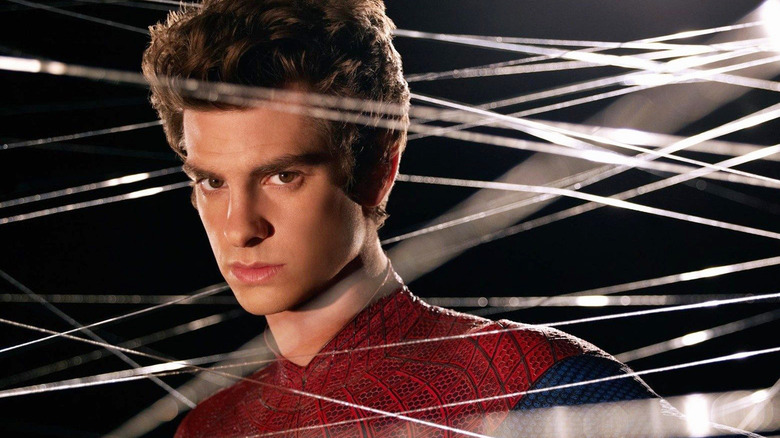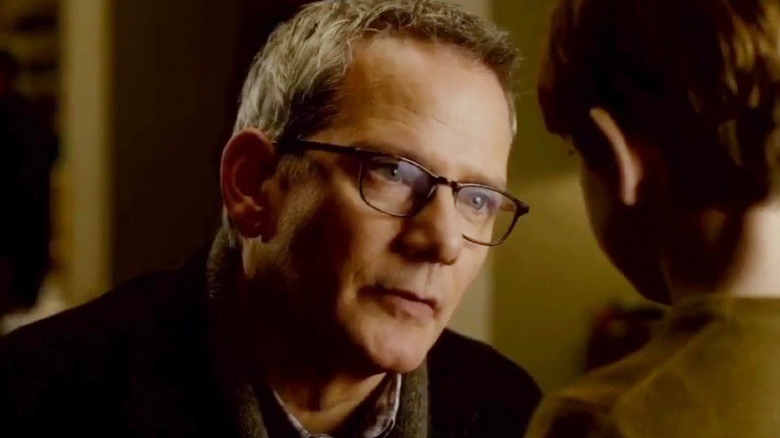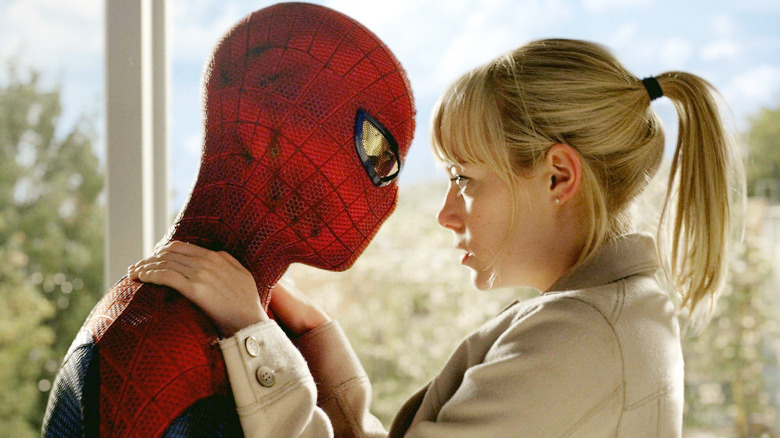The Tragic History Of Andrew Garfield's Amazing Spider-Man, Explained
Life is never easy for Peter Parker, whether he's a comic book character, the lead in an animated series, or a flesh and blood person. Director Sam Raimi's "Spider-Man" movie trilogy threw everything but an actual kitchen sink at Tobey Maguire's iteration of the web-slinger, including the deaths of friends and family, economic hardship, and Peter's need to keep secrets, even when it meant doing harm to his most treasured relationships. And although Tom Holland's Peter Parker has had it relatively easier in the lead-up to his return in "Spider-Man: No Way Home," he has also had to deal with the loss of loved ones and seen relationships shattered due to him prioritizing his super-heroic duties over his personal happiness.
Out of all the live-action Spider-Men so far, however, none have led a life as rough as that of Andrew Garfield's Peter Parker in the "Amazing Spider-Man" movies. With Dr. Curt Connors, AKA Lizard, from "The Amazing Spider-Man" and Max Dillon, AKA Electro, from "The Amazing Spider-Man 2" crossing over into the MCU thanks to the multiversal story in "No Way Home," let's look back at the movies where they got their start, and where the tragic tale of Garfield's Spider-Man began.
The Truth About Peter's Parents
As with Maguire's web-head, Garfield's Peter Parker was raised by his Aunt May and Uncle Ben since he was a kid. But where Raimi's films never showed Peter's parents, "The Amazing Spider-Man" opens with young Pete being separated from his father and mother, Richard and Mary Parker, after they discover someone broke into their home. They leave Peter with May and Ben for what Richard promises will only be "a little while." Years later, though, Peter has grown up into a moody teenager who avoids socializing with others, the painful memories of his parents inexplicably abandoning him still fresh in his mind.
In time, Peter begins to unravel the mystery behind his parents' disappearance, discovering his father did genetic research with Dr. Connors for Oscorp. Yet, in trying to reconnect with his parents through Connors, Peter accidentally gives the latter the information he needs to complete his experiments, transforming him into The Lizard. It's not until "The Amazing Spider-Man 2" that Peter finds Richard's secret lab and learns the truth: Richard refused to make bio-weapons for Oscorp and fled with Mary, realizing the corporation would use Peter to get to him.
"The Amazing Spider-Man 2" also includes a prologue that confirms Peter and Mary died after an assassin hired by Oscorp hijacked their personal jet and caused it to crash. But even without that knowledge, Peter finally gains some closure at the end of the movie by accepting he will never see them again.
Uncle Ben and Harry Osborn
Uncle Ben's tragic death and Peter's tumultuous friendship with Harry Osborn were major parts of Raimi's "Spider-Man" movie trilogy and factored into the stories for all three entries. The "Amazing Spider-Man" films, on the other hand, played things a little differently.
Where Peter and Harry were high school besties in Raimi's "Spider-Man," Harry hasn't been present in Peter's life for years when "The Amazing Spider-Man" picks up and doesn't even appear in the film. As "The Amazing Spider-Man 2" reveals, Harry's father Norman sent him off to boarding school when was eleven to focus on finding a cure for retroviral hyperplasia: the genetic terminal illness that's long plagued their family. It's only upon becoming a legal adult and taking control of Oscorp after his father's death that Harry rekindles ties with Peter (who knows a thing or two about having an absentee dad) — at least before things take a dark turn, which we will touch on later.
By comparison, Ben's demise in "The Amazing Spider-Man" hits the same general beats as his death in Raimi's "Spider-Man," with Ben getting shot after Peter allows an armed thief to escape in retaliation for the burglar's victim screwing him over minutes earlier. But where Maguire's Spider-Man had confessed his role in Ben's fate to May and forgiven his uncle's true killer by the end of Raimi's trilogy, the "Amazing Spider-Man" films concluded before Garfield's superhero got the chance to do either of those things.
Peter and Gwen's Love Story
After Raimi's "Spider-Man" movies featured Mary Jane Watson as Peter's love interest, the "Amazing Spider-Man" films brought in Peter's first romantic interest from Marvel's comic books: Gwen Stacy. "The Amazing Spider-Man" follows Peter and Gwen as high schoolers who fall in love, only for tragedy to strike when Gwen's father is mortally wounded during Peter's final showdown with the Lizard and, having only just learned he's Spider-Man, he begs Pete to protect Gwen by staying away from her before dying.
Peter, being a teenager, tries but quickly fails to honor that promise. Still, he can't escape his guilt, which leads to him constantly breaking up then getting back together with Gwen until she ends their relationship herself after they graduate high school in "The Amazing Spider-Man 2." But just as it seems they're done for good, with Gwen headed to Oxford, Peter professes his love to her and agrees to follow her to England.
By this point, though, Harry — who becomes the Green Goblin after Peter (as Spider-Man) refuses to let him use his blood to treat his illness — and Electro, an ex-Oscorp employee with a grudge against Spidey, have teamed up, forcing Peter and Gwen to do battle. Recalling her infamous comic book fate, Gwen is killed during their fight, leaving Peter to mourn her for months ... until he watches a recording of her graduation speech (which he missed seeing in-person) and finds the strength to resume his crime-fighting duties.



